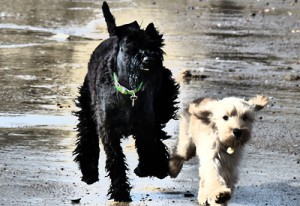
The Kerry Blue is a medium sized Terrier, which stands between 17” and 19” inches high at the shoulder. They were originally bred in Ireland as an all round farm dog, for controlling vermin, herding and guarding stock, also retrieving, and today’s Kerries are normally sociable, mischievous, very healthy and delightful members of the family.
Kerries enjoy company particularly human and dislike being left on their own. A household where the whole family is out from morning to evening is quite unsuitable for a Kerry.
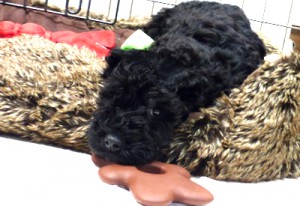
He needs a home with a garden, which needs to be fenced! Kerries are not great diggers, though there is always the exception to the rule, but jumping can be right up their street! So five to six foot high fencing is recommended. He can also squeeze through small spaces, so you will need to make sure you have the right sort of fencing as well as making sure it is high and deep enough.
Remember that your Kerry will need to be exercised preferably each day, and part of that time should, if possible, be free running in a safe area away from traffic or livestock. Never forget what the Kerry was bred for, and his instincts can show up in his behaviour on walks. Kerries are tough and love being with a family, but children must be taught to respect all dogs and not treat them like toys. Your Terrier should be provided with a special place of its own such as the folding metal crates where children are not allowed to go or disturb the dog.
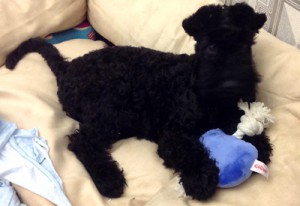
The Kerry is full of fun, enthusiastic and always ready for any sort of activity. He is a non-moulting and non-smelling breed which is an asset for any home, plus due to his coat is a great dog for families which have any type of allergy. He also is a healthy breed, having no hereditary conditions that affect him adversely.
Bringing any dog into your home is a great commitment in time and patience and some people have found that they are unable to cope with a very young family at the same time. Though being great lovers of children most Kerries fit in exceptionally well with young families.
Buying a Kerry Blue Puppy
Always buy a puppy from a specialist breeder where you will see the puppies with their mother and sometimes even their father.
Never obtain a puppy from a pet shop, puppy dealer, a Free AD, a market, or from a puppy superstore.
The secretaries of Kerry Blue Breed Clubs are probably the best place to start and many have Codes of Ethics, which cover the responsible way to breed and sell puppies. Contact details are given at the back. The Kennel Club or even your local veterinary surgeon may also be able to give you the names and addresses of reputable breeders in your area, but by no means be under the illusion that because the Kennel Club provides details of breeders that they are recommending them! After all they are just accepting the fees for litter registration and certainly in most cases will have absolutely no knowledge of whether these puppies are bred by genuine breeders or not. Finding a breeder who can provide you with references of other families who have purchased puppies from him/her would be a good move.
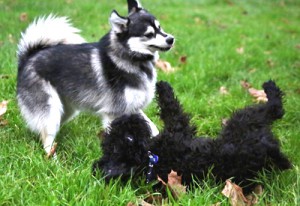
Once you have found a breeder make your own very extensive enquiries over the telephone before making any sort of commitment or even arrangements to view.
You should be able to see a litter of puppies by appointment, but please don’t turn up with the whole family on the first visit. Many prospective purchasers visit the litter several times before they take their puppy home, but you will need to check this out with the breeder first.
Talking with a breeder and with other owners will give you additional information about the needs of the Kerry. A responsible breeder will take the time to talk to you about the breed. This is both for your benefit and the good of the puppy. Beware of the breeder who does not ask you questions, or is not prepared to answer your questions and who wants you to hand over the money and leave in as short a time as possible.
It is also recommended that you contemplate attending a few dog shows where the breed is scheduled, and where you will be in a position to also see if this breed is for you or not, plus speak to several established breeders.
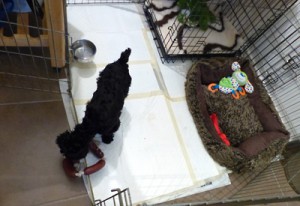
Never buy a puppy without a copy of the Pedigree or a Registration Certificate. It may be cheaper than those bred by a responsible breeder, but may not have been well reared. Time and time again, consumer watchdog programmes have revealed the appalling conditions some of these cheap puppies are reared in. Buying from such an establishment will help perpetuate the problem, so try not to fall in the trap of feeling sorry for the puppies. Someone will – but then harden your heart and report your concerns to the Local Authority.
Kerry Blues are generally healthy and a Kerry puppy is ready to go to a new home once it is at least eight weeks old. A responsible breeder will have begun the process of socialising the puppy with strange people and noises before it goes to its new home.
Registration
The progeny of a bitch who is more than eight years old or one who has already reared six litters of puppies cannot be registered at the Kennel Club. The breeder should hand over a signed Pedigree, the Kennel Club Registration Certificate if available at the time, and diet sheet.
Many will supply you with some of the food that your puppy has been used to. A responsible and caring breeder will be willing to answer any questions or concerns you may have in the early days and months after you have taken your puppy home. Many will want to know if, for any reason, you feel you can no longer keep the Kerry you bought from them.
To transfer the puppy to your ownership at the Kennel Club, you will need to fill in the reverse side of the Registration Certificate and return it with the appropriate fee to the Kennel Club. If this is done within ten days, your puppy will receive Healthcare Insurance for six weeks. Many breeders insure their puppies for veterinary costs, loss and so on for the first few weeks with their new owners and you are advised to consider extending this cover with a special policy.
The Early Weeks
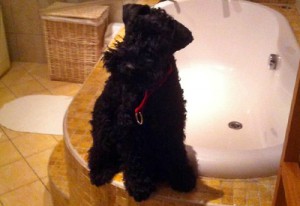
The early weeks of a puppy’s life are vital in its development, both physical and emotional. It’s a good idea to read up about a dog’s development before you take your puppy home, so that the whole family can be consistent in its approach to training. This is vital for a Kerry who, if given conflicting rules, may become reluctant to obey the rules that he does not like! So if you don’t want your Kerry on the furniture, make sure that everyone in the house sticks to the rules or you could find yourself in confrontation with your Kerry and in a few cases, this could lead to obsessive and territorial behaviour. Start how you mean to go on and with kindness let him know where he stands right from the very beginning.
Time spent with your puppy especially during the first few weeks will pay off handsomely as your Kerry grows into a well-balanced and well-behaved companion.
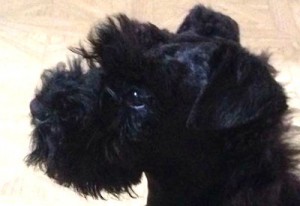
Taking Your New Kerry Home
Ensure that your garden is completely escape proof and be aware that particularly when very young a puppy can be caught in wrought iron gates and some types of paling fence. Take extra care if you have a puppy and a garden pond.
Make sure that there are no electric cables or trailing leads in the area in which your Kerry will sometimes be left unattended, because they may be chewed – with fatal results.
Your Kerry will also need its own water and feeding bowls – metal ones are safest for a puppy as they enjoy chewing the plastic variety! Hopefully the breeder will supply you with enough of the food your puppy is used to eating to last a few days – but if not, make sure you have a supply of food for him. A sudden change in diet for a young puppy will probably lead to a very upset stomach and your puppy will have enough to cope with already.
A small soft collar (as worn by cats) and a lightweight nylon lead are suitable for a puppy to begin with.
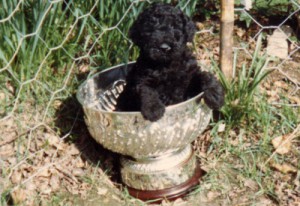
Allocate an area and bed which are the Kerry’s own. Most owners find an area in the kitchen or utility room which can be adapted. If you have a puppy, try using a baby’s playpen or mesh panels, available at DIY stores for making compost bins, for making a pen – both are ideal. As far as the bed itself is concerned, the hard moulded plastic variety is easy to keep clean and more resistant to chewing than the wicker type. For very small puppies, it’s best to start off with a cardboard box with one side cut out as an entrance. This can be replaced frequently as the puppy grows and chews, but please avoid boxes with metal staples which can be dangerous.
You might also consider buying a collapsible metal crate as the Kerry’s own ‘house’. Dogs love these crates and they have a wide variety of uses. They make ideal dog beds at home and on holiday and also provide a place to go that’s away from visitors and their children – especially if they dislike dogs. They’re a secure place to keep a Kerry if doors are left open, as well as a safe haven when potentially dangerous activities are going on in the home.
They can also be an aid to house training, but the Kerry should never be locked in one for too long without an opportunity to relieve itself. The crates are collapsible and fold flat in seconds, so they are also ideal for using in the car, with no fear of your Kerry ever jumping out as soon as the car door is opened. They can also protect the interior from costly damage.
Whichever type of bed you decide to use, your Kerry will need clean bedding at least once a week. Something old and warm can be used for a puppy to snuggle up in, but do check that there are no buttons or fasteners left on that can be chewed and swallowed. You can also buy a special type of warm, non-allergenic bedding called Vet Bed. It’s available from good pet stores and dog shows and many breeders use it for rearing puppies. It’s really tough and hard-wearing and can be put in the washing machine.
One other piece of equipment that many Kerry owners find useful is a baby gate. It can be used to bar your Kerry
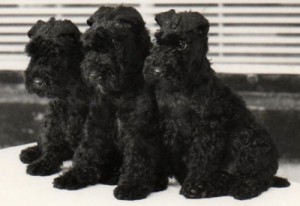
from a specific room, or prevent him from going upstairs. However, he will still be able to see you and will therefore not feel left out of the family’s activities. One thing to bear in mind though is that prior to the age of about 10/11 weeks of age your Kerry can squeeze through!
A Healthy and Happy Kerry
As soon as you obtain your Kerry puppy, contact your local veterinary surgeon to find out the programme of vaccinations. This does vary with the type of vaccines used, but until your puppy has received its first full course it must not be taken out where other dogs may have been. You can still take your puppy out to get used to new noises and sights. Wrap him in a blanket or towel (in case of leaks!) and carry your precious bundle safely in your arms, or go for a short journey in the car.
Watch out for fleas, especially in hot weather or if there are hedgehogs about, and if necessary, treat adult Kerries with a spray or shampoo. Never treat a young puppy for fleas without first obtaining veterinary advice. Check your Kerrys ears weekly; they should be clean without long hairs inside and there are several products you can buy that will help.
Some Kerries, more likely as puppies, may have weepy eyes; this generally will disappear with daily washing of the eyes with a clean damp cloth or cotton wool.
Some, especially those who don’t get much exercise on hard surfaces, grow rather long toe nails. Pay attention by clipping the tip off or by filing; otherwise you’ll need to get your vet’s help. Check teeth regularly and if you start soon enough, most Kerries will tolerate having their teeth brushed or cleaned using one of the several products now easily obtainable from pet suppliers.
Worm infestation is very common in dogs and cats and can cause distress and ill health. Your Kerry puppy will have been wormed by a responsible breeder at least three times before you collect him. With regular worming, it doesn’t matter where your pet goes, or when, you can be confident that you are protecting other people and pets.
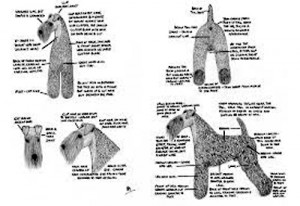
If you obtain your Kerry from a reputable breeder again you will have been given advice regarding grooming and trimming and a trimming chart. The Kerry is a high maintenance coat care breed requiring trimming on a regular basis. All good breeders will have trimmed your Kerry puppy ready for collection but you will need to have him trimmed again several weeks later. Unfortunately the people who can trim the breed correctly are few and far between and if your breeder is unable to do this for you in the future he may well be able to suggest the nearest best person local to do so. Most Kerry owners go to Professional groomers many of whom may say they can trim a Kerry but in many cases are unable to do so correctly and most of the time your Kerry will look like a Schnauzer or even worse. Some people will trim their Kerry themselves but specialist equipment is needed. Regardless, you certainly will need a good brush and comb for his weekly groom. Again advice on equipment can be obtained from the breeder.
Kerries are not particularly difficult dogs to feed. However, do keep to the breeder’s recommended diet, because any sudden changes may well upset a puppy’s digestive system. A full-grown Kerry at approximately one year will need one meal a day of meat and biscuit meal. There are also many good quality complete diets, which come in a dry pellet form and these are both economical and convenient to use. As your Kerry gets older and less active, you may need to adjust the diet and feed less protein. Remember that clean water must always be available, especially for a puppy.
Fireworks. Some dogs cope well with fireworks and others are petrified. It may be helpful to know there is now a CD available which has the sounds of a firework display recorded on it. The idea is that it is played quietly at first with the volume being gradually increased as the dog becomes used to the noise. There are several companies which can be found on the internet supplying these.
Your Responsibilities
By law your Kerry must wear a collar when in a public place, bearing your name and address. Remember to check regularly that the tag is still in place and clearly readable. Change the address if you are away on holiday. The Animal Act places responsibility for any accident or damage caused by your Terrier firmly on you. Check your household insurance policy or think about taking out special dog insurance with one of the specialised companies.
Microchipping is compulsory for all dog owners as of April 2016 in England, following an announcement made by the Westminster Government that has been welcomed by Dogs Trust. The Welsh Government has also announced that microchipping will be compulsory for all dogs – date to be confirmed. Don’t wait for the change to become law, be responsible and organise an appointment with your Vet for your precious Kerry to be microchipped.
Get your dog microchipped and have the assurance that should he become lost (or be stolen), he is more likely to be returned to you safe and sound.
Don’t play into the hands of the anti-dog lobby, so train your Kerry not to foul in public places and always carry a plastic bag or ‘poop-scoop’ to clean up any mistakes. Please be a responsible Kerry owner and never allow your Terrier to be noisy or annoy others.
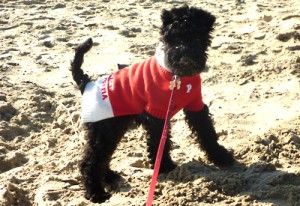
Please think carefully before you invite a Kerry to join your household, but remember that in return for your time and care, a Kerry will reward you with love, loyalty and friendship for an average of 12 to 14 years.
A Few Training Tips:
BE CONSISTENT – Use the same words for the same actions. Try to be aware of your body movements when you give a command.
DON’T ASK HIM, TELL HIM – You are the boss, do not let him think he is.
FINISH WHAT YOU START – If you give a command he must carry it out. Do not tell him to do anything unless you are prepared to take time to correct him, if necessary.
USE YOUR VOICE – Experiment with the tones you use when you start training. You will be surprised how effective this can be. Do not be afraid to put real feeling into your voice, and when you tell him to do something, make it sound like a command. When you are pleased with him, also let him know by the tone of your voice.
KEEP IT FUN – A puppy will only co-operate well if you are both enjoying the lesson. Keep it light and end every lesson with praise. Do not put pressure on him to learn something for which he is not ready. If he does not learn something easily, forget it for a week and then try again. There will be plenty of time for serious training when he is older. Remember that you should both enjoy puppy training.
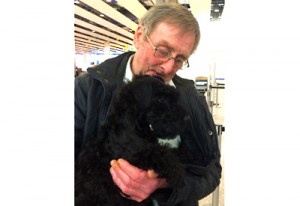
Your vet will have a list of local qualified and trusted training providers. Vet or trainer organised puppy parties are a great way of socialising your puppy.
EAR SETTING – please see Grooming page which has a great section on Setting the Ears on a Kerry Blue Terrier Puppy
